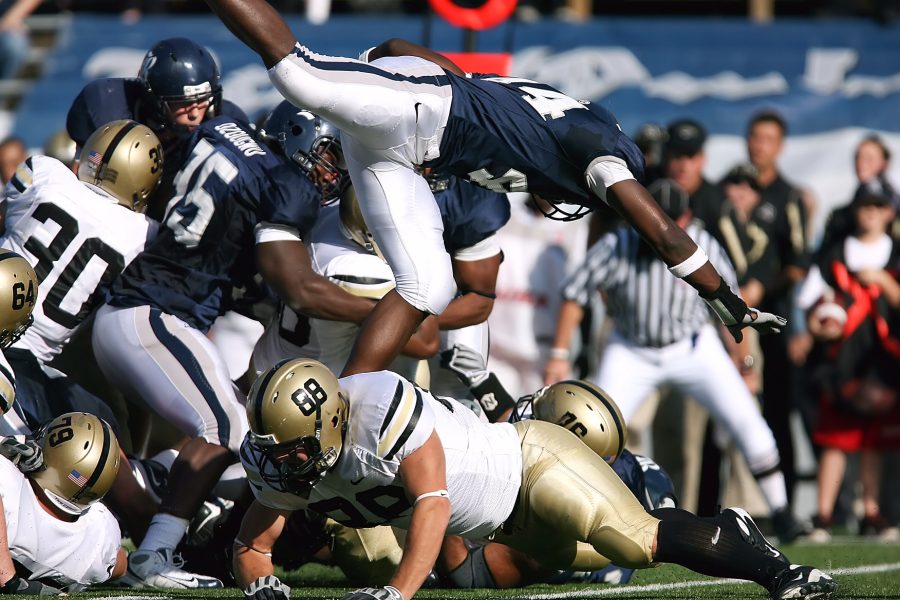Reporting concussions: Why do athletes ignore symptoms?
April 10, 2017
Not all concussions are willingly reported. The biggest problem surrounding concussions is underreporting – and it’s often not the player’s own fault. Sometimes, coaches and parents preach toughness and urge youth athletes to return to the game after injury.
Nowadays, there are individuals responsible for detecting concussions in games called “spotters.” Major leagues such as the NFL, NHL, and MLB now have spotters in the press box to look out for dangerous collisions and to inform the team trainer of concussion symptoms. Astutely, this plan has been implemented into youth athletics as well.
According to research done by the University of Pennsylvania, 27% of athletes who play contact sports said they had hid a concussion in order to stay in a game and 54% of athletes said it would be highly unlikely they would report a concussion in any game situation. While it is quite dangerous for a person to not report a concussion, there is also another side to the situation people often don’t discuss.
It may at times be difficult to even know you’ve suffered a concussion, which makes it hard to report one. So, although reporting head trauma is the main way to prevent future damage, it isn’t always easy to know a person has one.
A concussion specialist at the University of Buffalo Neurosurgery department has unique and potentially lifesaving advice for people who participate in sports. Dr. Elad Levy, a highly experienced neurologist, has done research on the dangers of childhood concussions.
Dr. Levy described the simple ways to “self-diagnose” yourself if you think you may have suffered a concussion. He went on to explain that, “There is a relatively easy way to see if you sustained a concussion that can be taught to almost anybody. Coaches, parents, young kids and high school athletes should know this one trick to check if you should go back in the game, or stay out and be further evaluated.”
Dr. Levy demonstrated the method on me and explained that it is like something a police officer would do for a DWI. He had me mimic his actions – he put his pointer finger on his nose and slowly moved it away at a steady pace and asked me to track it with my eyes. According to Dr. Levy, you feel at all dizzy or have trouble staying focused on the fingertip, he recommends staying out of any competition and seeking medical consultation.
“This simple method can be the difference between serious brain damage or a safe future,” Dr. Levy said.
Concussions are no joke, so when you even have a slight thought that you’ve sustained one, imminently do what’s best for your health and report it.
To further the research on the dangers of not reporting serious head trauma, I reached out to find an individual who has suffered from concussions. A friend who is on the Hilbert Hawks soccer team put me in touch with one of his teammates.
Dan has played soccer all his life and has sustained “more than 10 concussions” in his playing career. Dan told me that, “Out of all of my concussions playing soccer, I’d say I told my coaches and parents about half of them.” This was alarming, but not surprising.
Sometimes, you may not even have to have direct contact with your head to get a concussion. That’s why it is often difficult to know you have one.
“Most of the time it was collisions with other players or heading the ball, but I did get one from being tripped by another player. I did not hit my head but the whipping motion of my neck caused a minor one.”
Although concussions are almost inevitable in all sports, what can be controlled is the future health of athletes. To do that, competitors need to realize that they need to report a serious concussion to somebody. Like Dr. Levy told me, it is best to inform parents, coaches, and players to watch out for the symptoms and signs of concussions. Taking informational classes and learning “self-diagnoses” methods are simple ways to prevent further damage.
email: [email protected]





Jack Smith • Apr 11, 2017 at 1:49 pm
The reporting of concussions by youth players is directly affected by their coaches, parents, the athlete, and peer influences.
It goes without saying that a player feels an attachment to their team. They don’t want to ‘let the team down’, or their coach. How their peers feel about a concussion ‘injury’ will also have a factor. A concussion is not an injury that can be visibly ‘seen’ by others, and often is considered to be a trivial item by uninformed parties. Youth players can be heavily influenced by peers, who indicate that the player is ‘needed’ on the field. A coach and the players peers may indicate in some form that the player should ‘play through’/’shake off’ the injury. Male coaches can sometimes be heard telling male players to ‘man up’, or ‘be a man’. They are forgetting that they are not speaking to men, they are speaking to children. The same commentary may be heard by a player from one, or both of their players, who might tell them to be ‘tough’.
A player has a lot of data to shift through, from external sources, in making a decision to inform someone about a possible concussion. They also have their own natural inclination to ‘want to play’.
I have more commentaries on my concussion awareness site regarding the decision to report/not report a concussion: http://www.yatahoy.com/sample-page/concussion-dilemma-youth-player/